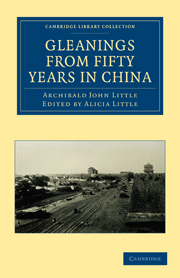Book contents
- Frontmatter
- FOREWORD
- EDITORIAL NOTE
- Contents
- PART I TRADE AND POLITICS
- PART II TRAVEL
- THE ROMANCE OF CHINESE TRAVEL
- A NEW ROAD
- A CHINESE SULPHUR BATH
- THE NEW RAPID AND THE ARRIVAL OF THE FIRST STEAMER IN CHUNGKING
- THE DANGERS OF THE UPPER YANGTSE
- SZECHUAN REVISITED
- YACHTING IN THE CHUSAN ARCHIPELAGO
- RETROSPECT OF EVENTS IN CHINA
- PART III DRAMA AND LEGEND
- PART IV RELIGION AND PHILOSOPHY
- INDEX
- Plate section
A NEW ROAD
Published online by Cambridge University Press: 10 November 2010
- Frontmatter
- FOREWORD
- EDITORIAL NOTE
- Contents
- PART I TRADE AND POLITICS
- PART II TRAVEL
- THE ROMANCE OF CHINESE TRAVEL
- A NEW ROAD
- A CHINESE SULPHUR BATH
- THE NEW RAPID AND THE ARRIVAL OF THE FIRST STEAMER IN CHUNGKING
- THE DANGERS OF THE UPPER YANGTSE
- SZECHUAN REVISITED
- YACHTING IN THE CHUSAN ARCHIPELAGO
- RETROSPECT OF EVENTS IN CHINA
- PART III DRAMA AND LEGEND
- PART IV RELIGION AND PHILOSOPHY
- INDEX
- Plate section
Summary
One of the most striking defects in the civilisation of China is the absence of anything that can be truly called a road. It seems strange that so vast, so populous, and, in many ways, so highly civilised a State should have held together longer than any other empire in history in default of any decent means of intercommunication. The wonder is that China did not remain the congeries of independent States that it practically was in the time of Confucius and such as Europe is now. Too few details have come down to us of the events of the third century before Christ—which led to the union of the whole empire under the despotism of Chin Shih Hwangti, the “First Emperor” so called—for us to understand how the Napoleon of China succeeded where a similar attempt, and by a more consummate genius, in Europe, two thousand years later, utterly broke down. We know that China again split up into “Three Kingdoms” four hundred years afterwards, and was not finally reunited until after another century of internecine strife. Since then, amidst the many struggles that have accompanied the several changes of dynasties, no attempt at separation has taken place, although did any province desire to set up for itself, nothing would seem to be easier than to hold any invading troops at bay in the roadless mountains which generally form the boundaries.
- Type
- Chapter
- Information
- Gleanings from Fifty Years in China , pp. 117 - 127Publisher: Cambridge University PressPrint publication year: 2010First published in: 1910

